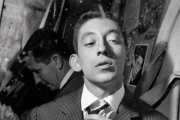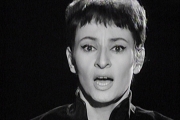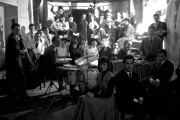Synopsis
Between 1945 and 1968, Barbara, Jacques Brel, Charles Aznavour, Léo Ferré, Juliette Gréco, Jean Ferrat, les Frères Jacques, Serge Gainsbourg, Boby Lapointe, Pierre Perret and many others great singers started their careers on small Parisian stages which became legendary such as : Le Milord, L’Arsouille, Le Tabou, L’Écluse, Le Vieux Colombier, L’Échelle de Jacob… etc. More than 200 cabarets opened in Paris, first at Saint-Germain-des-Prés and then in the Contrescarpe neighborhood.
Through archival footage, interviews and songs, this documentary takes us into the excitement of Paris Left Bank cabarets, where a youth eager for novelty jammed in to listen to its favorite singers. The film also consists of numerous interviews of artists such as Juliette Gréco, actor Jean Rochefort, particularly eloquent, Charles Aznavour, Pierre Perret, Serge Lama, Anne Sylvestre, Paul Tourenne, one of the Frères Jacques and the lyricist Henri Gougaud, who is also the advisor on this film.
 The Cultural Service
The Cultural Service
of the French Embassy:
Supporting Contribution
for Documentary Screenings
Credits
Director: Yves Jeuland
Screenplay: Yves Jeuland
Producer: Zadig Productions, Arte France and INA
Schedule & Presentation
![]() Presentation by and discussion with director and screenwriter Yves Jeuland
Presentation by and discussion with director and screenwriter Yves Jeuland
More information
You are a politics and history fanatic, how did you come to directing this film?
I am also a fan of French songs and I have been ever since I was a child. Songs have always been a part of my inner world as they are of my films’. For me, songs are part of our collective memory; I have always considered songs as archives and not just simple sound illustrations.
Where did you find the archive material?
Essentially at the National Audiovisual Institute. I spent many nights in the archives. Artist by artist, I wanted to see it all, to know it all. For me, the essence of documentary is that it allows you to take your time. A film is never really finished until you have taken the appropriate time at all stages of its production: preparation, research, editing.
How to define the Left Bank’s spirit of that time?
It is a more bohemian, more authentic, more intellectual spirit than the Right Bank’s. The quality of the texts is higher, the artists’ stipends lower, and the audience more attentive. “On the Left Bank, there is no champagne bucket” says Henri Gougaud. “On the Right Bank, there is something hopelessly middle-class.”
The title of the film, Il est minuit, Paris s’éveille (It is midnight, and Paris is awakening), is that a homage to Barbara or to the song by Jacques Dutronc?
I wanted the title to include the words “Paris” and “night”. It is true that Barbara was referred to as “La chanteuse de minuit” (The Midnight Singer) but the cabarets were also called “Les petites scènes de minuit” (Midnight’s small stages). The title refers at the same time to an era when everything was happening around midnight, and to the song by Dutronc, Il est cinq heures, Paris s’éveille (It’s five o’clock, Paris is awakening). Dutronc wrote this song in 1968, a time when the history of cabarets of the Left Bank was more or less ending. With him, times were changing; France was entering a new era.
Olivier Milot, Télérama






